A Report on Ethics, Sustainability, and Social Impact of FRT in the UK
VerifiedAdded on 2023/01/13
|9
|2638
|68
Report
AI Summary
This report provides a comprehensive analysis of Facial Recognition Technology (FRT) in the UK, focusing on its ethical, sustainable, and social implications. It begins with an overview of FRT, detailing its functionalities and applications, including its use in advertising, finding missing persons, and forensic investigations. The report then delves into the ethical considerations surrounding FRT, addressing concerns about privacy and security. It explores ethical theories such as utilitarianism, deontology, and Rawls' theory of justice to evaluate the ethical implications of FRT. The report further examines the use of FRT in the UK, considering its ethical implications and legal uncertainties. It concludes with a balanced assessment of the technology's benefits and drawbacks, offering insights into its potential impact on society and individuals. The report emphasizes the importance of ethical frameworks and policies in mitigating potential risks and ensuring responsible implementation of FRT.
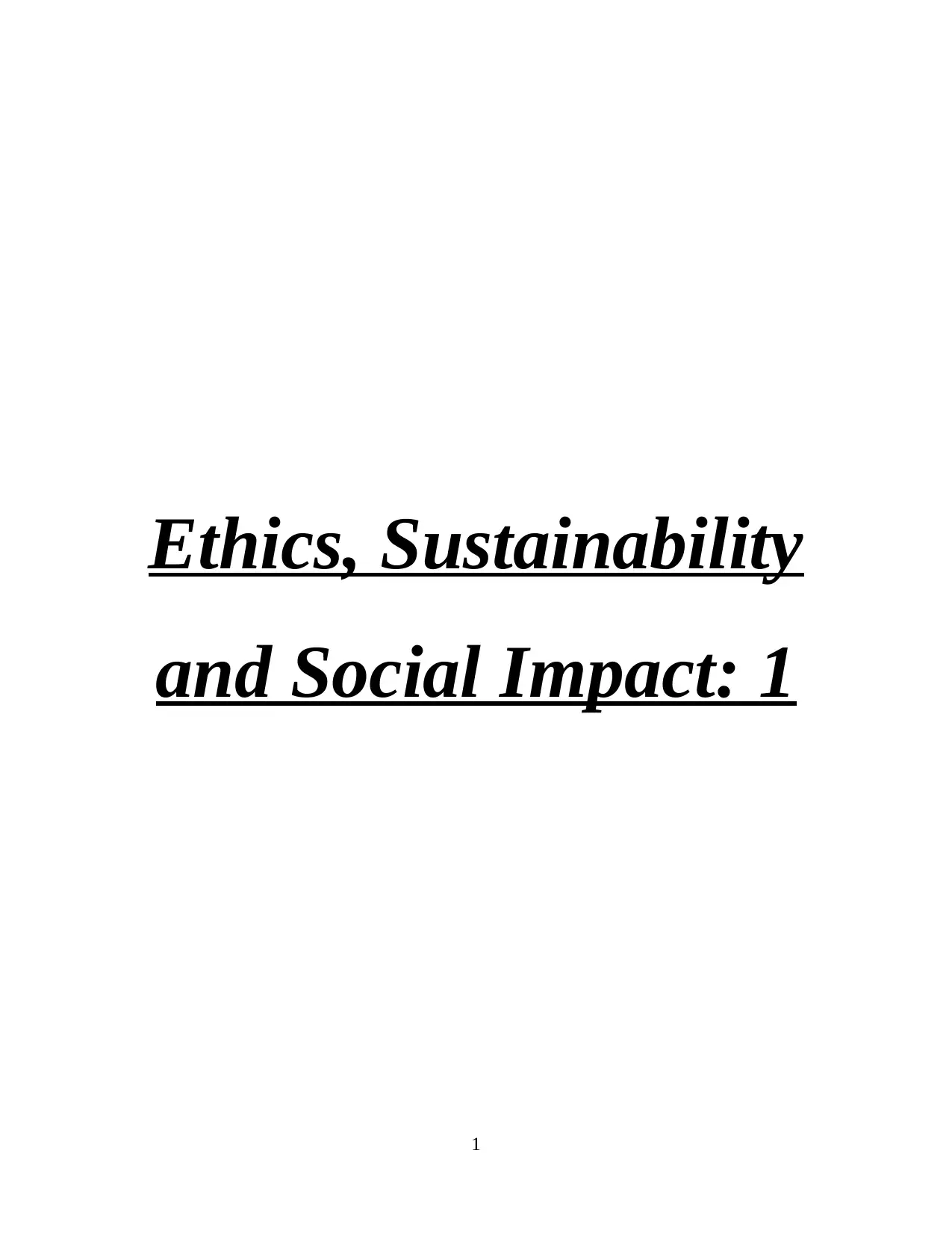
Ethics, Sustainability
and Social Impact: 1
1
and Social Impact: 1
1
Paraphrase This Document
Need a fresh take? Get an instant paraphrase of this document with our AI Paraphraser
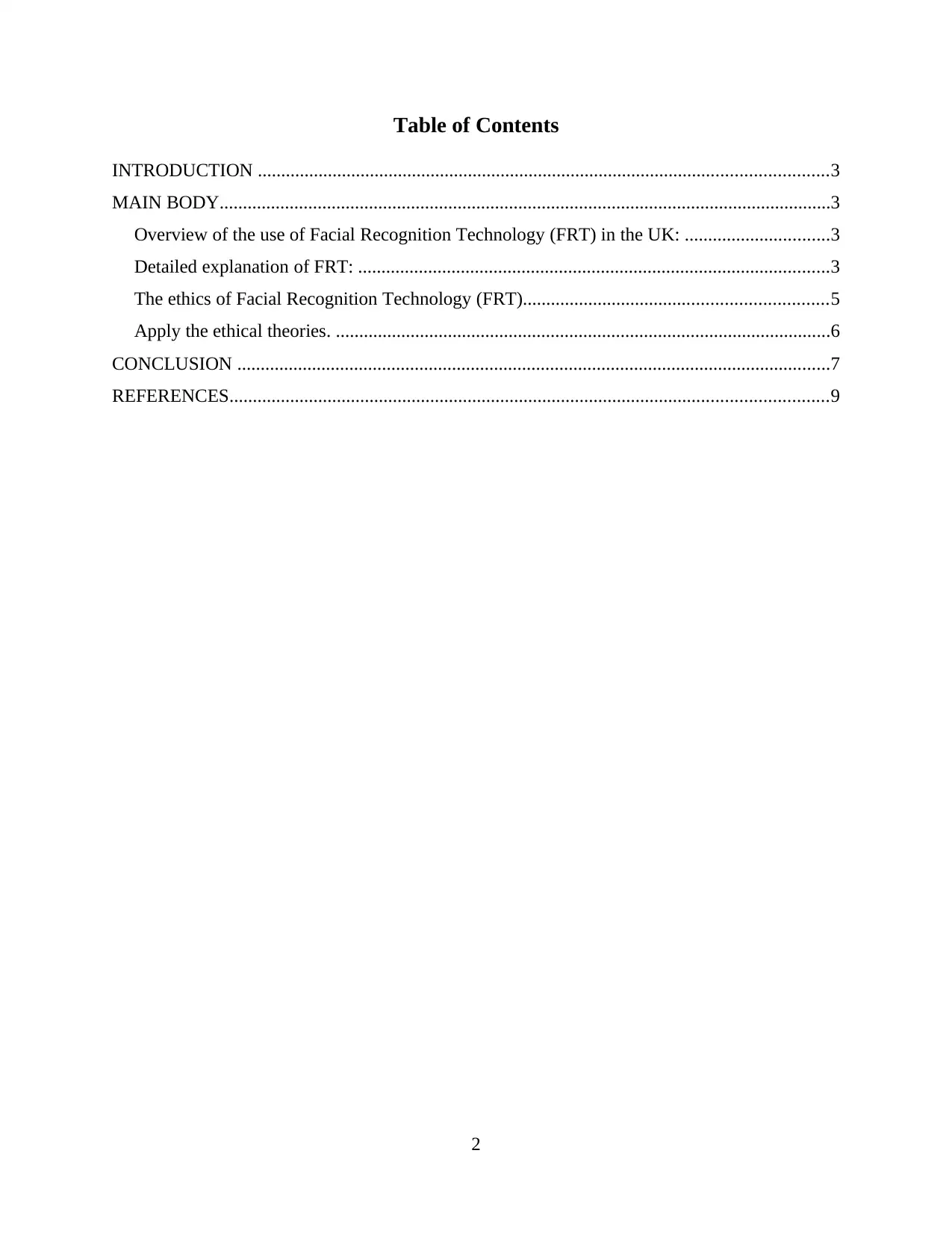
Table of Contents
INTRODUCTION ..........................................................................................................................3
MAIN BODY...................................................................................................................................3
Overview of the use of Facial Recognition Technology (FRT) in the UK: ...............................3
Detailed explanation of FRT: .....................................................................................................3
The ethics of Facial Recognition Technology (FRT).................................................................5
Apply the ethical theories. ..........................................................................................................6
CONCLUSION ...............................................................................................................................7
REFERENCES................................................................................................................................9
2
INTRODUCTION ..........................................................................................................................3
MAIN BODY...................................................................................................................................3
Overview of the use of Facial Recognition Technology (FRT) in the UK: ...............................3
Detailed explanation of FRT: .....................................................................................................3
The ethics of Facial Recognition Technology (FRT).................................................................5
Apply the ethical theories. ..........................................................................................................6
CONCLUSION ...............................................................................................................................7
REFERENCES................................................................................................................................9
2
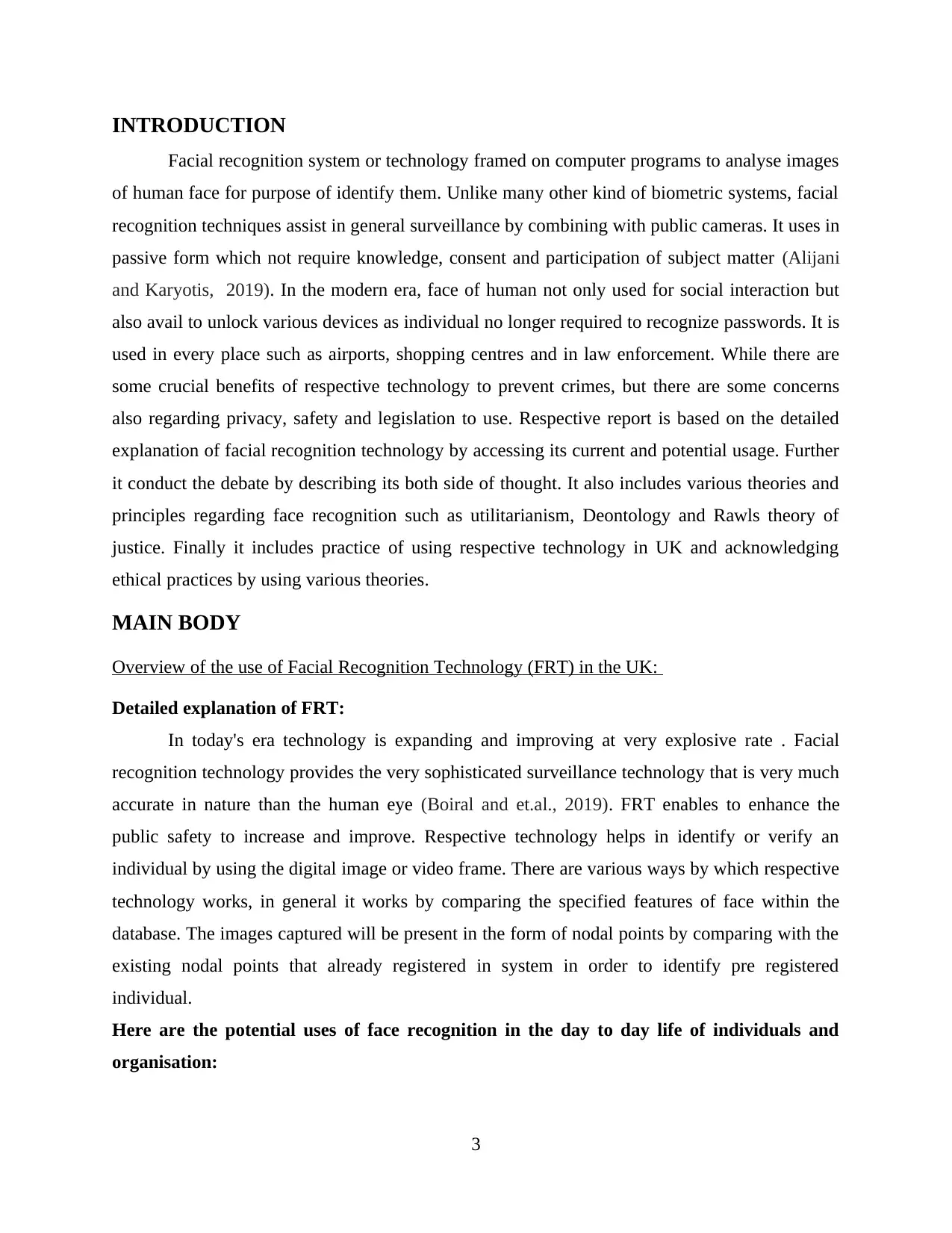
INTRODUCTION
Facial recognition system or technology framed on computer programs to analyse images
of human face for purpose of identify them. Unlike many other kind of biometric systems, facial
recognition techniques assist in general surveillance by combining with public cameras. It uses in
passive form which not require knowledge, consent and participation of subject matter (Alijani
and Karyotis, 2019). In the modern era, face of human not only used for social interaction but
also avail to unlock various devices as individual no longer required to recognize passwords. It is
used in every place such as airports, shopping centres and in law enforcement. While there are
some crucial benefits of respective technology to prevent crimes, but there are some concerns
also regarding privacy, safety and legislation to use. Respective report is based on the detailed
explanation of facial recognition technology by accessing its current and potential usage. Further
it conduct the debate by describing its both side of thought. It also includes various theories and
principles regarding face recognition such as utilitarianism, Deontology and Rawls theory of
justice. Finally it includes practice of using respective technology in UK and acknowledging
ethical practices by using various theories.
MAIN BODY
Overview of the use of Facial Recognition Technology (FRT) in the UK:
Detailed explanation of FRT:
In today's era technology is expanding and improving at very explosive rate . Facial
recognition technology provides the very sophisticated surveillance technology that is very much
accurate in nature than the human eye (Boiral and et.al., 2019). FRT enables to enhance the
public safety to increase and improve. Respective technology helps in identify or verify an
individual by using the digital image or video frame. There are various ways by which respective
technology works, in general it works by comparing the specified features of face within the
database. The images captured will be present in the form of nodal points by comparing with the
existing nodal points that already registered in system in order to identify pre registered
individual.
Here are the potential uses of face recognition in the day to day life of individuals and
organisation:
3
Facial recognition system or technology framed on computer programs to analyse images
of human face for purpose of identify them. Unlike many other kind of biometric systems, facial
recognition techniques assist in general surveillance by combining with public cameras. It uses in
passive form which not require knowledge, consent and participation of subject matter (Alijani
and Karyotis, 2019). In the modern era, face of human not only used for social interaction but
also avail to unlock various devices as individual no longer required to recognize passwords. It is
used in every place such as airports, shopping centres and in law enforcement. While there are
some crucial benefits of respective technology to prevent crimes, but there are some concerns
also regarding privacy, safety and legislation to use. Respective report is based on the detailed
explanation of facial recognition technology by accessing its current and potential usage. Further
it conduct the debate by describing its both side of thought. It also includes various theories and
principles regarding face recognition such as utilitarianism, Deontology and Rawls theory of
justice. Finally it includes practice of using respective technology in UK and acknowledging
ethical practices by using various theories.
MAIN BODY
Overview of the use of Facial Recognition Technology (FRT) in the UK:
Detailed explanation of FRT:
In today's era technology is expanding and improving at very explosive rate . Facial
recognition technology provides the very sophisticated surveillance technology that is very much
accurate in nature than the human eye (Boiral and et.al., 2019). FRT enables to enhance the
public safety to increase and improve. Respective technology helps in identify or verify an
individual by using the digital image or video frame. There are various ways by which respective
technology works, in general it works by comparing the specified features of face within the
database. The images captured will be present in the form of nodal points by comparing with the
existing nodal points that already registered in system in order to identify pre registered
individual.
Here are the potential uses of face recognition in the day to day life of individuals and
organisation:
3
⊘ This is a preview!⊘
Do you want full access?
Subscribe today to unlock all pages.

Trusted by 1+ million students worldwide
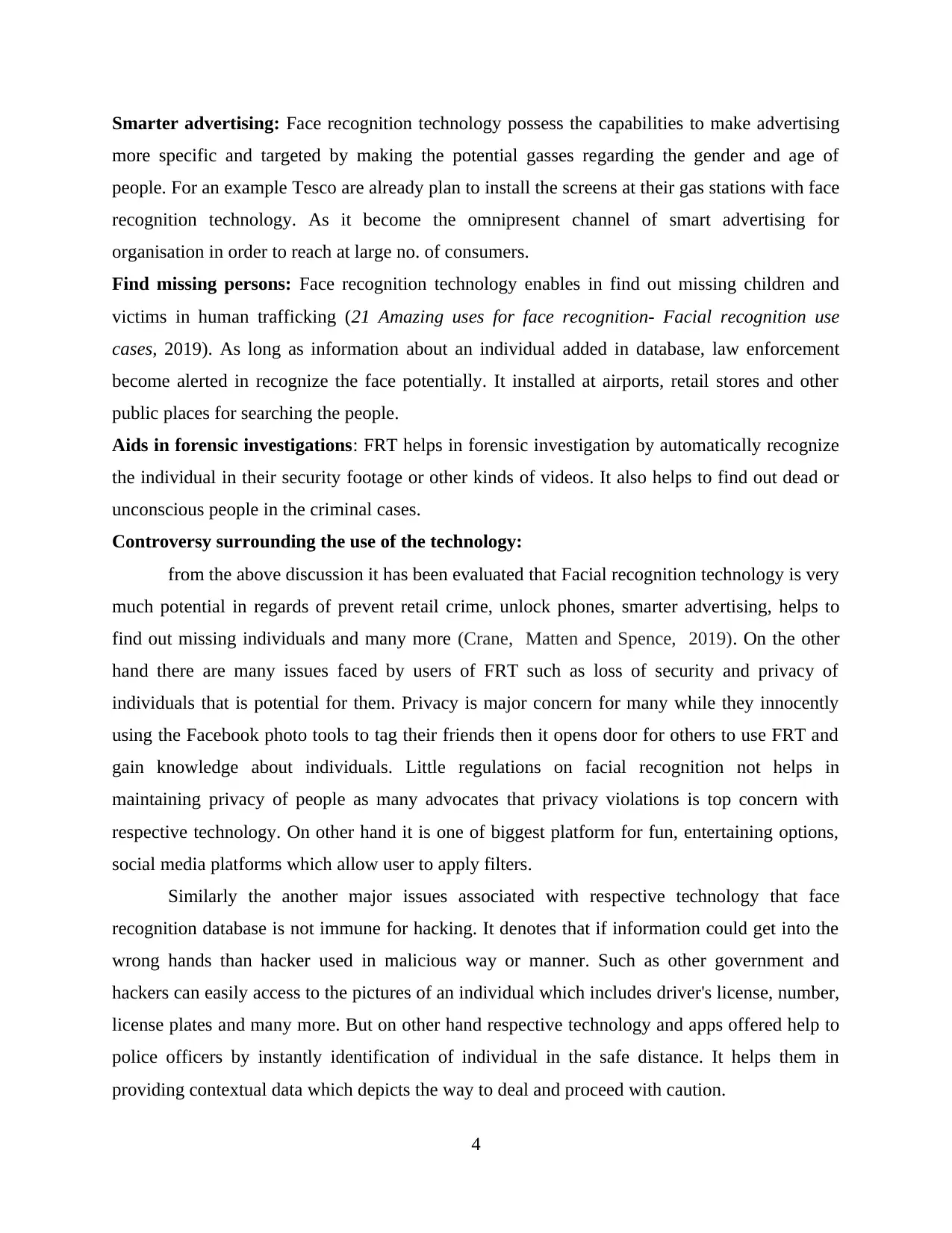
Smarter advertising: Face recognition technology possess the capabilities to make advertising
more specific and targeted by making the potential gasses regarding the gender and age of
people. For an example Tesco are already plan to install the screens at their gas stations with face
recognition technology. As it become the omnipresent channel of smart advertising for
organisation in order to reach at large no. of consumers.
Find missing persons: Face recognition technology enables in find out missing children and
victims in human trafficking (21 Amazing uses for face recognition- Facial recognition use
cases, 2019). As long as information about an individual added in database, law enforcement
become alerted in recognize the face potentially. It installed at airports, retail stores and other
public places for searching the people.
Aids in forensic investigations: FRT helps in forensic investigation by automatically recognize
the individual in their security footage or other kinds of videos. It also helps to find out dead or
unconscious people in the criminal cases.
Controversy surrounding the use of the technology:
from the above discussion it has been evaluated that Facial recognition technology is very
much potential in regards of prevent retail crime, unlock phones, smarter advertising, helps to
find out missing individuals and many more (Crane, Matten and Spence, 2019). On the other
hand there are many issues faced by users of FRT such as loss of security and privacy of
individuals that is potential for them. Privacy is major concern for many while they innocently
using the Facebook photo tools to tag their friends then it opens door for others to use FRT and
gain knowledge about individuals. Little regulations on facial recognition not helps in
maintaining privacy of people as many advocates that privacy violations is top concern with
respective technology. On other hand it is one of biggest platform for fun, entertaining options,
social media platforms which allow user to apply filters.
Similarly the another major issues associated with respective technology that face
recognition database is not immune for hacking. It denotes that if information could get into the
wrong hands than hacker used in malicious way or manner. Such as other government and
hackers can easily access to the pictures of an individual which includes driver's license, number,
license plates and many more. But on other hand respective technology and apps offered help to
police officers by instantly identification of individual in the safe distance. It helps them in
providing contextual data which depicts the way to deal and proceed with caution.
4
more specific and targeted by making the potential gasses regarding the gender and age of
people. For an example Tesco are already plan to install the screens at their gas stations with face
recognition technology. As it become the omnipresent channel of smart advertising for
organisation in order to reach at large no. of consumers.
Find missing persons: Face recognition technology enables in find out missing children and
victims in human trafficking (21 Amazing uses for face recognition- Facial recognition use
cases, 2019). As long as information about an individual added in database, law enforcement
become alerted in recognize the face potentially. It installed at airports, retail stores and other
public places for searching the people.
Aids in forensic investigations: FRT helps in forensic investigation by automatically recognize
the individual in their security footage or other kinds of videos. It also helps to find out dead or
unconscious people in the criminal cases.
Controversy surrounding the use of the technology:
from the above discussion it has been evaluated that Facial recognition technology is very
much potential in regards of prevent retail crime, unlock phones, smarter advertising, helps to
find out missing individuals and many more (Crane, Matten and Spence, 2019). On the other
hand there are many issues faced by users of FRT such as loss of security and privacy of
individuals that is potential for them. Privacy is major concern for many while they innocently
using the Facebook photo tools to tag their friends then it opens door for others to use FRT and
gain knowledge about individuals. Little regulations on facial recognition not helps in
maintaining privacy of people as many advocates that privacy violations is top concern with
respective technology. On other hand it is one of biggest platform for fun, entertaining options,
social media platforms which allow user to apply filters.
Similarly the another major issues associated with respective technology that face
recognition database is not immune for hacking. It denotes that if information could get into the
wrong hands than hacker used in malicious way or manner. Such as other government and
hackers can easily access to the pictures of an individual which includes driver's license, number,
license plates and many more. But on other hand respective technology and apps offered help to
police officers by instantly identification of individual in the safe distance. It helps them in
providing contextual data which depicts the way to deal and proceed with caution.
4
Paraphrase This Document
Need a fresh take? Get an instant paraphrase of this document with our AI Paraphraser
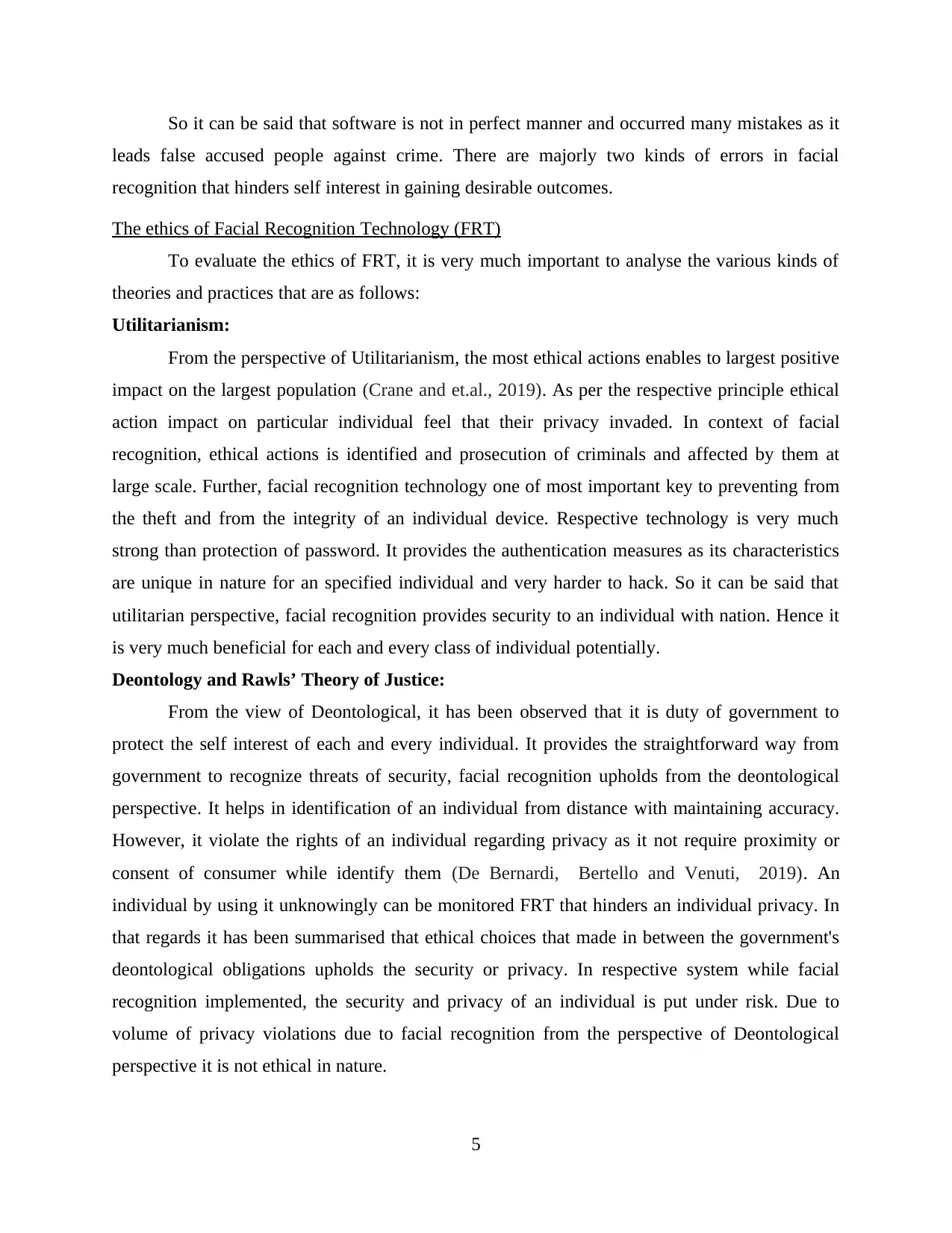
So it can be said that software is not in perfect manner and occurred many mistakes as it
leads false accused people against crime. There are majorly two kinds of errors in facial
recognition that hinders self interest in gaining desirable outcomes.
The ethics of Facial Recognition Technology (FRT)
To evaluate the ethics of FRT, it is very much important to analyse the various kinds of
theories and practices that are as follows:
Utilitarianism:
From the perspective of Utilitarianism, the most ethical actions enables to largest positive
impact on the largest population (Crane and et.al., 2019). As per the respective principle ethical
action impact on particular individual feel that their privacy invaded. In context of facial
recognition, ethical actions is identified and prosecution of criminals and affected by them at
large scale. Further, facial recognition technology one of most important key to preventing from
the theft and from the integrity of an individual device. Respective technology is very much
strong than protection of password. It provides the authentication measures as its characteristics
are unique in nature for an specified individual and very harder to hack. So it can be said that
utilitarian perspective, facial recognition provides security to an individual with nation. Hence it
is very much beneficial for each and every class of individual potentially.
Deontology and Rawls’ Theory of Justice:
From the view of Deontological, it has been observed that it is duty of government to
protect the self interest of each and every individual. It provides the straightforward way from
government to recognize threats of security, facial recognition upholds from the deontological
perspective. It helps in identification of an individual from distance with maintaining accuracy.
However, it violate the rights of an individual regarding privacy as it not require proximity or
consent of consumer while identify them (De Bernardi, Bertello and Venuti, 2019). An
individual by using it unknowingly can be monitored FRT that hinders an individual privacy. In
that regards it has been summarised that ethical choices that made in between the government's
deontological obligations upholds the security or privacy. In respective system while facial
recognition implemented, the security and privacy of an individual is put under risk. Due to
volume of privacy violations due to facial recognition from the perspective of Deontological
perspective it is not ethical in nature.
5
leads false accused people against crime. There are majorly two kinds of errors in facial
recognition that hinders self interest in gaining desirable outcomes.
The ethics of Facial Recognition Technology (FRT)
To evaluate the ethics of FRT, it is very much important to analyse the various kinds of
theories and practices that are as follows:
Utilitarianism:
From the perspective of Utilitarianism, the most ethical actions enables to largest positive
impact on the largest population (Crane and et.al., 2019). As per the respective principle ethical
action impact on particular individual feel that their privacy invaded. In context of facial
recognition, ethical actions is identified and prosecution of criminals and affected by them at
large scale. Further, facial recognition technology one of most important key to preventing from
the theft and from the integrity of an individual device. Respective technology is very much
strong than protection of password. It provides the authentication measures as its characteristics
are unique in nature for an specified individual and very harder to hack. So it can be said that
utilitarian perspective, facial recognition provides security to an individual with nation. Hence it
is very much beneficial for each and every class of individual potentially.
Deontology and Rawls’ Theory of Justice:
From the view of Deontological, it has been observed that it is duty of government to
protect the self interest of each and every individual. It provides the straightforward way from
government to recognize threats of security, facial recognition upholds from the deontological
perspective. It helps in identification of an individual from distance with maintaining accuracy.
However, it violate the rights of an individual regarding privacy as it not require proximity or
consent of consumer while identify them (De Bernardi, Bertello and Venuti, 2019). An
individual by using it unknowingly can be monitored FRT that hinders an individual privacy. In
that regards it has been summarised that ethical choices that made in between the government's
deontological obligations upholds the security or privacy. In respective system while facial
recognition implemented, the security and privacy of an individual is put under risk. Due to
volume of privacy violations due to facial recognition from the perspective of Deontological
perspective it is not ethical in nature.
5
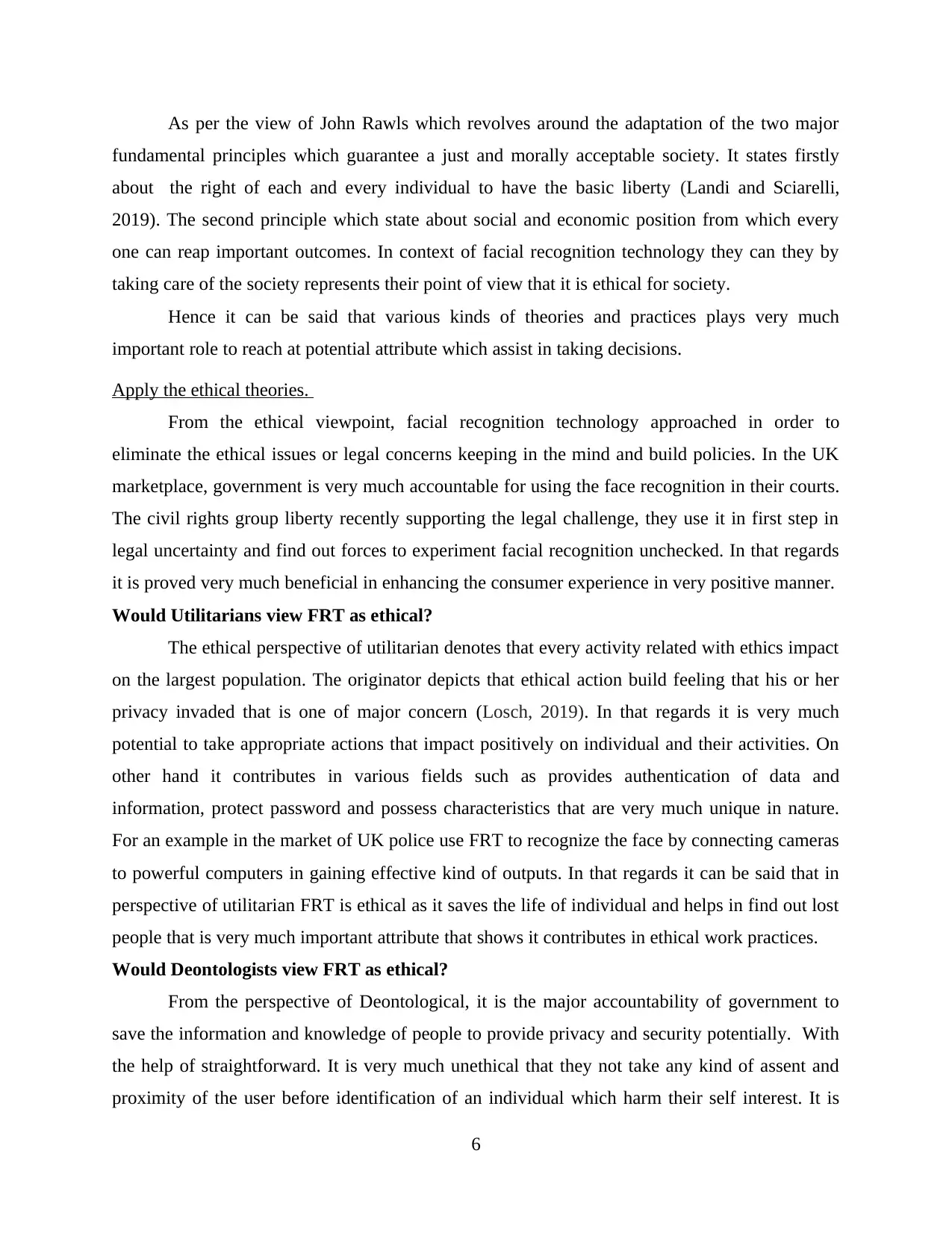
As per the view of John Rawls which revolves around the adaptation of the two major
fundamental principles which guarantee a just and morally acceptable society. It states firstly
about the right of each and every individual to have the basic liberty (Landi and Sciarelli,
2019). The second principle which state about social and economic position from which every
one can reap important outcomes. In context of facial recognition technology they can they by
taking care of the society represents their point of view that it is ethical for society.
Hence it can be said that various kinds of theories and practices plays very much
important role to reach at potential attribute which assist in taking decisions.
Apply the ethical theories.
From the ethical viewpoint, facial recognition technology approached in order to
eliminate the ethical issues or legal concerns keeping in the mind and build policies. In the UK
marketplace, government is very much accountable for using the face recognition in their courts.
The civil rights group liberty recently supporting the legal challenge, they use it in first step in
legal uncertainty and find out forces to experiment facial recognition unchecked. In that regards
it is proved very much beneficial in enhancing the consumer experience in very positive manner.
Would Utilitarians view FRT as ethical?
The ethical perspective of utilitarian denotes that every activity related with ethics impact
on the largest population. The originator depicts that ethical action build feeling that his or her
privacy invaded that is one of major concern (Losch, 2019). In that regards it is very much
potential to take appropriate actions that impact positively on individual and their activities. On
other hand it contributes in various fields such as provides authentication of data and
information, protect password and possess characteristics that are very much unique in nature.
For an example in the market of UK police use FRT to recognize the face by connecting cameras
to powerful computers in gaining effective kind of outputs. In that regards it can be said that in
perspective of utilitarian FRT is ethical as it saves the life of individual and helps in find out lost
people that is very much important attribute that shows it contributes in ethical work practices.
Would Deontologists view FRT as ethical?
From the perspective of Deontological, it is the major accountability of government to
save the information and knowledge of people to provide privacy and security potentially. With
the help of straightforward. It is very much unethical that they not take any kind of assent and
proximity of the user before identification of an individual which harm their self interest. It is
6
fundamental principles which guarantee a just and morally acceptable society. It states firstly
about the right of each and every individual to have the basic liberty (Landi and Sciarelli,
2019). The second principle which state about social and economic position from which every
one can reap important outcomes. In context of facial recognition technology they can they by
taking care of the society represents their point of view that it is ethical for society.
Hence it can be said that various kinds of theories and practices plays very much
important role to reach at potential attribute which assist in taking decisions.
Apply the ethical theories.
From the ethical viewpoint, facial recognition technology approached in order to
eliminate the ethical issues or legal concerns keeping in the mind and build policies. In the UK
marketplace, government is very much accountable for using the face recognition in their courts.
The civil rights group liberty recently supporting the legal challenge, they use it in first step in
legal uncertainty and find out forces to experiment facial recognition unchecked. In that regards
it is proved very much beneficial in enhancing the consumer experience in very positive manner.
Would Utilitarians view FRT as ethical?
The ethical perspective of utilitarian denotes that every activity related with ethics impact
on the largest population. The originator depicts that ethical action build feeling that his or her
privacy invaded that is one of major concern (Losch, 2019). In that regards it is very much
potential to take appropriate actions that impact positively on individual and their activities. On
other hand it contributes in various fields such as provides authentication of data and
information, protect password and possess characteristics that are very much unique in nature.
For an example in the market of UK police use FRT to recognize the face by connecting cameras
to powerful computers in gaining effective kind of outputs. In that regards it can be said that in
perspective of utilitarian FRT is ethical as it saves the life of individual and helps in find out lost
people that is very much important attribute that shows it contributes in ethical work practices.
Would Deontologists view FRT as ethical?
From the perspective of Deontological, it is the major accountability of government to
save the information and knowledge of people to provide privacy and security potentially. With
the help of straightforward. It is very much unethical that they not take any kind of assent and
proximity of the user before identification of an individual which harm their self interest. It is
6
⊘ This is a preview!⊘
Do you want full access?
Subscribe today to unlock all pages.

Trusted by 1+ million students worldwide
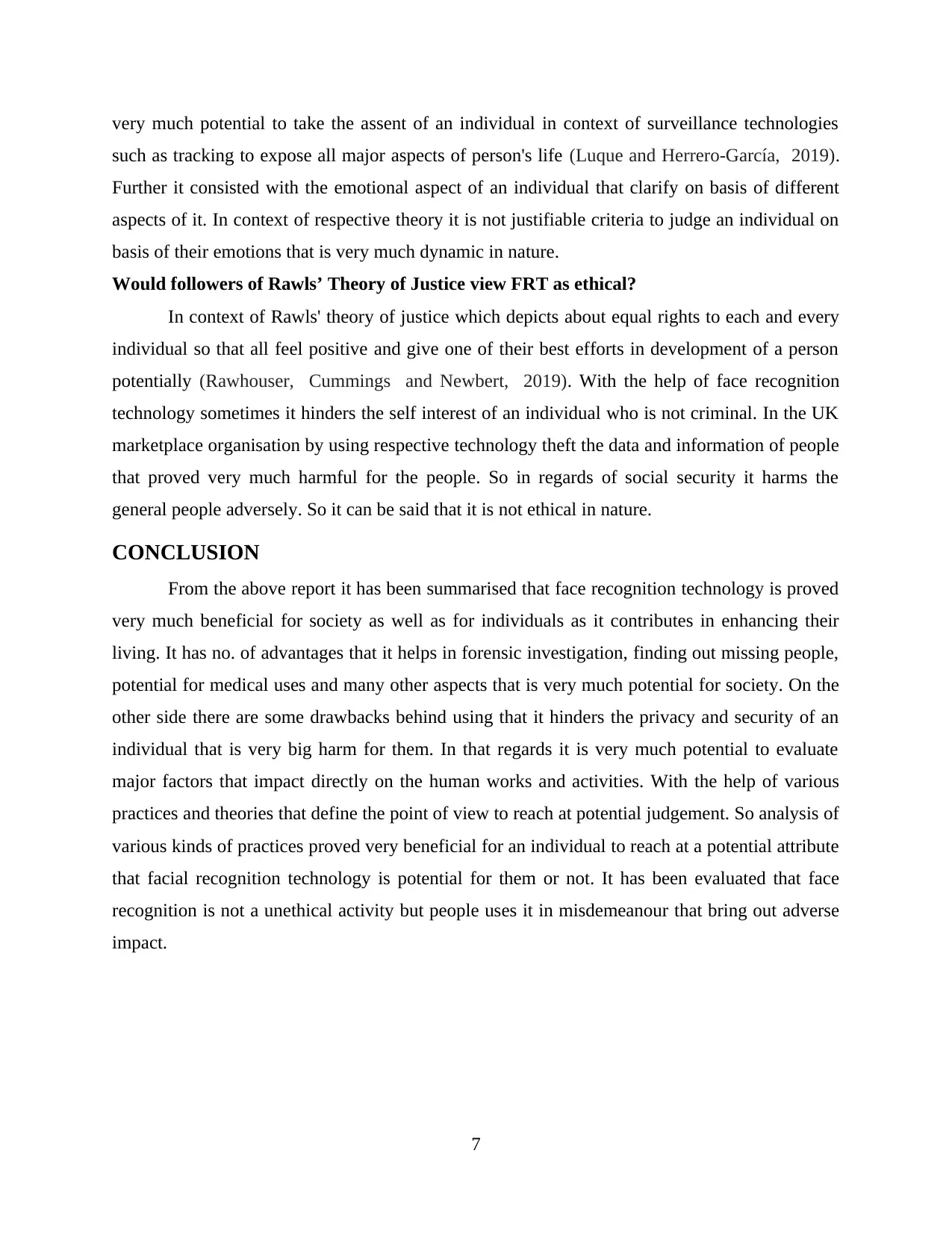
very much potential to take the assent of an individual in context of surveillance technologies
such as tracking to expose all major aspects of person's life (Luque and Herrero‐García, 2019).
Further it consisted with the emotional aspect of an individual that clarify on basis of different
aspects of it. In context of respective theory it is not justifiable criteria to judge an individual on
basis of their emotions that is very much dynamic in nature.
Would followers of Rawls’ Theory of Justice view FRT as ethical?
In context of Rawls' theory of justice which depicts about equal rights to each and every
individual so that all feel positive and give one of their best efforts in development of a person
potentially (Rawhouser, Cummings and Newbert, 2019). With the help of face recognition
technology sometimes it hinders the self interest of an individual who is not criminal. In the UK
marketplace organisation by using respective technology theft the data and information of people
that proved very much harmful for the people. So in regards of social security it harms the
general people adversely. So it can be said that it is not ethical in nature.
CONCLUSION
From the above report it has been summarised that face recognition technology is proved
very much beneficial for society as well as for individuals as it contributes in enhancing their
living. It has no. of advantages that it helps in forensic investigation, finding out missing people,
potential for medical uses and many other aspects that is very much potential for society. On the
other side there are some drawbacks behind using that it hinders the privacy and security of an
individual that is very big harm for them. In that regards it is very much potential to evaluate
major factors that impact directly on the human works and activities. With the help of various
practices and theories that define the point of view to reach at potential judgement. So analysis of
various kinds of practices proved very beneficial for an individual to reach at a potential attribute
that facial recognition technology is potential for them or not. It has been evaluated that face
recognition is not a unethical activity but people uses it in misdemeanour that bring out adverse
impact.
7
such as tracking to expose all major aspects of person's life (Luque and Herrero‐García, 2019).
Further it consisted with the emotional aspect of an individual that clarify on basis of different
aspects of it. In context of respective theory it is not justifiable criteria to judge an individual on
basis of their emotions that is very much dynamic in nature.
Would followers of Rawls’ Theory of Justice view FRT as ethical?
In context of Rawls' theory of justice which depicts about equal rights to each and every
individual so that all feel positive and give one of their best efforts in development of a person
potentially (Rawhouser, Cummings and Newbert, 2019). With the help of face recognition
technology sometimes it hinders the self interest of an individual who is not criminal. In the UK
marketplace organisation by using respective technology theft the data and information of people
that proved very much harmful for the people. So in regards of social security it harms the
general people adversely. So it can be said that it is not ethical in nature.
CONCLUSION
From the above report it has been summarised that face recognition technology is proved
very much beneficial for society as well as for individuals as it contributes in enhancing their
living. It has no. of advantages that it helps in forensic investigation, finding out missing people,
potential for medical uses and many other aspects that is very much potential for society. On the
other side there are some drawbacks behind using that it hinders the privacy and security of an
individual that is very big harm for them. In that regards it is very much potential to evaluate
major factors that impact directly on the human works and activities. With the help of various
practices and theories that define the point of view to reach at potential judgement. So analysis of
various kinds of practices proved very beneficial for an individual to reach at a potential attribute
that facial recognition technology is potential for them or not. It has been evaluated that face
recognition is not a unethical activity but people uses it in misdemeanour that bring out adverse
impact.
7
Paraphrase This Document
Need a fresh take? Get an instant paraphrase of this document with our AI Paraphraser
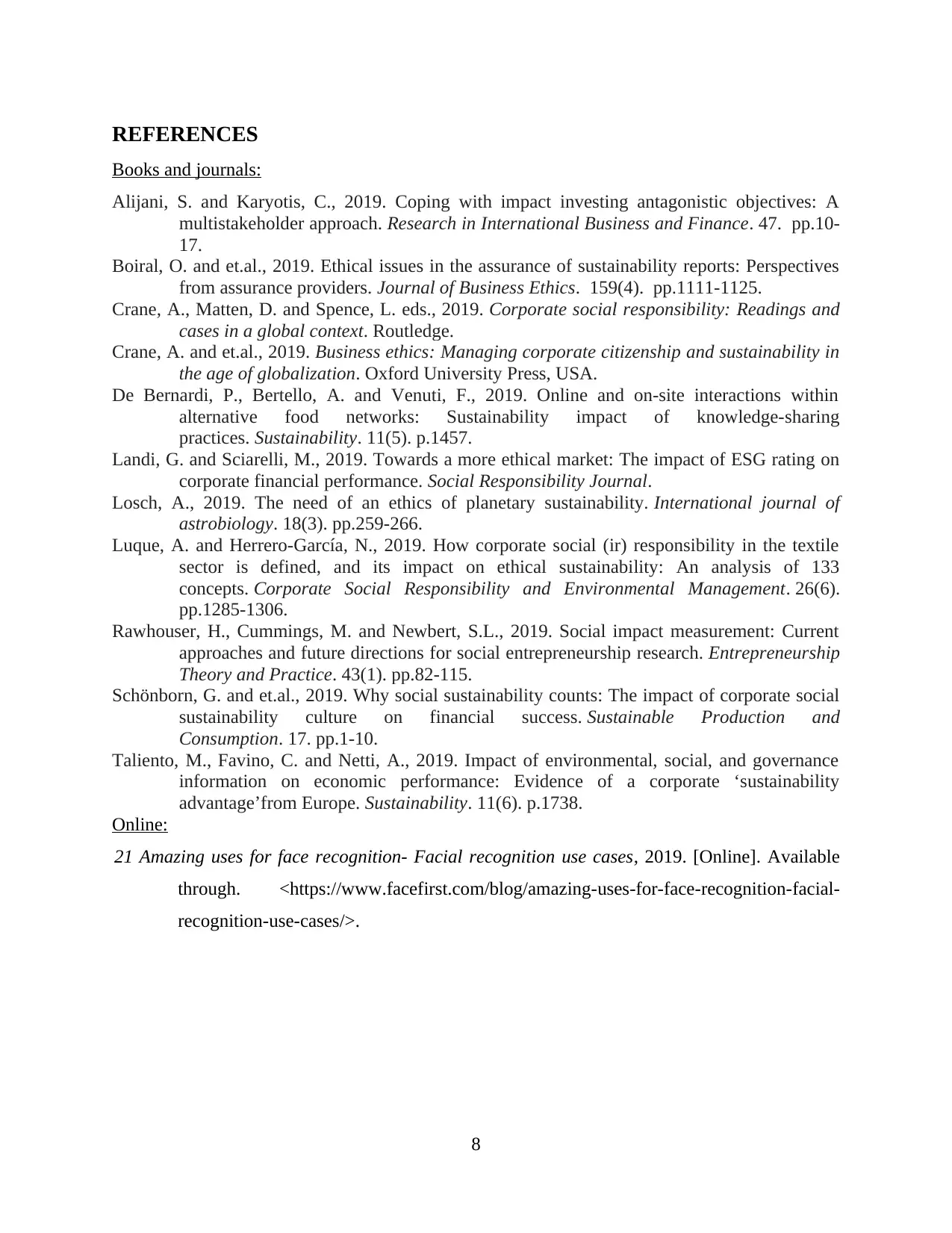
REFERENCES
Books and journals:
Alijani, S. and Karyotis, C., 2019. Coping with impact investing antagonistic objectives: A
multistakeholder approach. Research in International Business and Finance. 47. pp.10-
17.
Boiral, O. and et.al., 2019. Ethical issues in the assurance of sustainability reports: Perspectives
from assurance providers. Journal of Business Ethics. 159(4). pp.1111-1125.
Crane, A., Matten, D. and Spence, L. eds., 2019. Corporate social responsibility: Readings and
cases in a global context. Routledge.
Crane, A. and et.al., 2019. Business ethics: Managing corporate citizenship and sustainability in
the age of globalization. Oxford University Press, USA.
De Bernardi, P., Bertello, A. and Venuti, F., 2019. Online and on-site interactions within
alternative food networks: Sustainability impact of knowledge-sharing
practices. Sustainability. 11(5). p.1457.
Landi, G. and Sciarelli, M., 2019. Towards a more ethical market: The impact of ESG rating on
corporate financial performance. Social Responsibility Journal.
Losch, A., 2019. The need of an ethics of planetary sustainability. International journal of
astrobiology. 18(3). pp.259-266.
Luque, A. and Herrero‐García, N., 2019. How corporate social (ir) responsibility in the textile
sector is defined, and its impact on ethical sustainability: An analysis of 133
concepts. Corporate Social Responsibility and Environmental Management. 26(6).
pp.1285-1306.
Rawhouser, H., Cummings, M. and Newbert, S.L., 2019. Social impact measurement: Current
approaches and future directions for social entrepreneurship research. Entrepreneurship
Theory and Practice. 43(1). pp.82-115.
Schönborn, G. and et.al., 2019. Why social sustainability counts: The impact of corporate social
sustainability culture on financial success. Sustainable Production and
Consumption. 17. pp.1-10.
Taliento, M., Favino, C. and Netti, A., 2019. Impact of environmental, social, and governance
information on economic performance: Evidence of a corporate ‘sustainability
advantage’from Europe. Sustainability. 11(6). p.1738.
Online:
21 Amazing uses for face recognition- Facial recognition use cases, 2019. [Online]. Available
through. <https://www.facefirst.com/blog/amazing-uses-for-face-recognition-facial-
recognition-use-cases/>.
8
Books and journals:
Alijani, S. and Karyotis, C., 2019. Coping with impact investing antagonistic objectives: A
multistakeholder approach. Research in International Business and Finance. 47. pp.10-
17.
Boiral, O. and et.al., 2019. Ethical issues in the assurance of sustainability reports: Perspectives
from assurance providers. Journal of Business Ethics. 159(4). pp.1111-1125.
Crane, A., Matten, D. and Spence, L. eds., 2019. Corporate social responsibility: Readings and
cases in a global context. Routledge.
Crane, A. and et.al., 2019. Business ethics: Managing corporate citizenship and sustainability in
the age of globalization. Oxford University Press, USA.
De Bernardi, P., Bertello, A. and Venuti, F., 2019. Online and on-site interactions within
alternative food networks: Sustainability impact of knowledge-sharing
practices. Sustainability. 11(5). p.1457.
Landi, G. and Sciarelli, M., 2019. Towards a more ethical market: The impact of ESG rating on
corporate financial performance. Social Responsibility Journal.
Losch, A., 2019. The need of an ethics of planetary sustainability. International journal of
astrobiology. 18(3). pp.259-266.
Luque, A. and Herrero‐García, N., 2019. How corporate social (ir) responsibility in the textile
sector is defined, and its impact on ethical sustainability: An analysis of 133
concepts. Corporate Social Responsibility and Environmental Management. 26(6).
pp.1285-1306.
Rawhouser, H., Cummings, M. and Newbert, S.L., 2019. Social impact measurement: Current
approaches and future directions for social entrepreneurship research. Entrepreneurship
Theory and Practice. 43(1). pp.82-115.
Schönborn, G. and et.al., 2019. Why social sustainability counts: The impact of corporate social
sustainability culture on financial success. Sustainable Production and
Consumption. 17. pp.1-10.
Taliento, M., Favino, C. and Netti, A., 2019. Impact of environmental, social, and governance
information on economic performance: Evidence of a corporate ‘sustainability
advantage’from Europe. Sustainability. 11(6). p.1738.
Online:
21 Amazing uses for face recognition- Facial recognition use cases, 2019. [Online]. Available
through. <https://www.facefirst.com/blog/amazing-uses-for-face-recognition-facial-
recognition-use-cases/>.
8

9
⊘ This is a preview!⊘
Do you want full access?
Subscribe today to unlock all pages.

Trusted by 1+ million students worldwide
1 out of 9
Related Documents
Your All-in-One AI-Powered Toolkit for Academic Success.
+13062052269
info@desklib.com
Available 24*7 on WhatsApp / Email
![[object Object]](/_next/static/media/star-bottom.7253800d.svg)
Unlock your academic potential
Copyright © 2020–2026 A2Z Services. All Rights Reserved. Developed and managed by ZUCOL.



